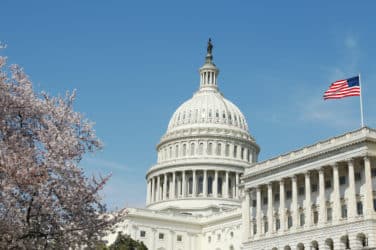The US Securities and Exchange Commission and the Commodity Futures Trading Commission want cryptocurrencies and initial coin offerings to enter the capital markets through the front door instead of trying to sneak in a back way, according to Senate testimony.
There has been a perception that bitcoin and other virtual currencies were off the regulatory grid, said CTFC Chairman Christopher Giancarlo in joint testimony before the Senate Committee on Banking, Housing, and Urban Affairs.
“One thing Chairman Clayton and I have been working so hard to do is to disabuse that notion,” he said. “We are limited in our regulatory standard for these underlying platforms, but when it comes to enforcement and ICOs, we are using our full authority to direct the message.”
The regulators have been in discussion with other Federal agencies and overseas regulators, such as Japan’s Financial Services Agency, to compare notes and develop further regulatory approaches.
“We are part of a virtual currency task force put together by the Department of the Treasury, which also include the Fed and FinCen,” said Giancarlo. “We have had our first meeting to set up the work streams, and we will have more to come.”
Giancarlo also noted that the CFTC had brought three enforcement actions in the last few weeks.
“There are more to come,” he added. “We are digging deep, learning a lot, and seeing a lot.”
When the testimony turned to the likelihood of the SEC approving cryptocurrency-based ETFs, asked by Sen. Jerry Moran (R-KS), SEC Chairman Clayton, reiterated that unlike the CFTC’s approval of bitcoin-based futures, the SEC still has reservations about cryptocurrencies’ price discovery, custody mechanisms, and volatility.
He noted that futures mainly are institutional products while ETFs predominately are offered to long investors.
“That is a different dynamic than a futures product,” he said. “We have long taken an investor-protection view of approving these types of products, which is embodied by our liquidity, custody, and pricing rules. If we get comfortable with those rules, we can move forward.”
ICO regulatory enforcement, on the other hand, has been an on-going issue for the SEC since it issued guidance in mid-2017 that the SEC would treat ICOs as securities offerings with all of the responsibilities under The Securities and Exchange Act of 1934.
When Sen. Elizabeth Warren (D-MA) inquired how many companies registered their completed and up-coming ICOs since the regulator published its guidance, Chairman Clayton’s response remained the same: “Not a one.”
He attributed much of it to the gatekeepers who the SEC relies on to make sure the securities laws are followed have not done their jobs.
“We have made it clear what the law is,” he said. “As I have said many times, there are thousands and thousands of private placements that go on every year in the US, and we want them to go on.”
Clayton just would prefer that companies conducting ICOs would follow the existing rules and not try to combine the benefits of a private placement with a general public solicitation and a promise to retail investors of a secondary market without registering it with the SEC.
“Folks somehow got comfortable that this was new and it was okay, and it was not a security, and it was just some other way to raise money,” he said. “I disagree.”





